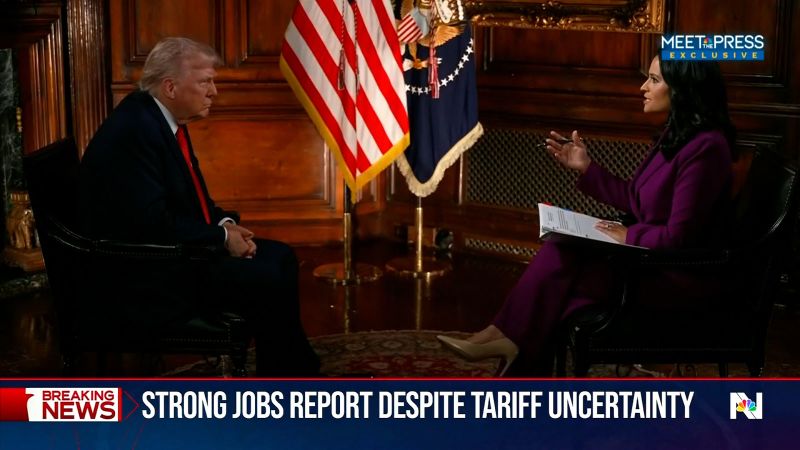President Donald Trump has publicly addressed concerns over the potential economic downturn attributed to his administration’s economic policies. In an interview with NBC News, managed by Kristen Welker, Trump asserted that despite possible immediate recessions, the economy would ultimately remain “OK” in the long term. This reflects a persistent optimism on Trump’s part, as he reflects the sentiments of certain Wall Street analysts who contend that the U.S. economy is on an upward trajectory, and that current challenges should not overshadow the potential for future prosperity.
The interview revealed Trump’s inclination to focus on positive predictions from specific financial experts and his tendency to downplay dire warnings from economists. He remarked, “Some people on Wall Street say that we’re going to have the greatest economy in history.” By highlighting these optimistic forecasts, Trump appears to be attempting to instill confidence in the public amidst rising fears of economic instability.
Further probing during the discussion led Trump to acknowledge the prospect of short-term recession as a necessary sacrifice for long-term success. He stated, “Look yes, everything’s OK. What we are — I said, this is a transition period. I think we’re going to do fantastically.” Within this context, it seems Trump views any temporary dips in the economy as part of a larger restructuring process intended to reshape global economic dynamics.
However, Trump’s assertions stand in stark contrast to actual economic indicators. According to recent data released by the Commerce Department, the U.S. Gross Domestic Product (GDP) reported a contraction of -0.3% in the first quarter, the most severe decline since 2022. This unexpected downturn highlights the impact of Trump’s aggressive trade policies, particularly his contentious trade war accompanied by fluctuating tariffs that have caused disruptions in trade with key partners, notably China.
Despite Trump’s assurance regarding the economy, many economists and market analysts are increasingly concerned about the ramifications of his administration’s tariff policies. Such tariffs, intended to safeguard American manufacturing, may inadvertently lead to economic menaces like inflation and shortages of goods. Earlier this week, Trump admitted that tariffs could lead to escalated costs for American consumers, stating, “Well, maybe the children will have two dolls instead of 30 dolls, you know?” His comments illustrate a recognition that the imposition of tariffs could force consumers to pay more for fewer products.
Moreover, the administration has previously indicated its willingness to accept a potential recession as an acceptable trade-off for restructuring economic priorities. Treasury Secretary Scott Bessent has suggested a need for a “detox” period for the economy, and Commerce Secretary Howard Lutnick has indicated that a recession could be “worth it” should the tariffs enhance U.S. manufacturing capabilities significantly.
Given the overarching structure of the U.S. economy, which relies heavily on consumer spending (accounting for about two-thirds of economic activity), the potential for recession looms markedly. Any disruption—whether from increased consumer costs or diminished inventory availability—poses significant risks of broader economic destabilization.
In summary, while Trump remains optimistic about the long-term trajectory of the economy, the immediate indicators indicate significant challenges that cannot be overlooked. As the situation develops, it remains uncertain if the U.S. economy is officially in recession, defined as a sustained decline in economic activity across various sectors. The complexities surrounding such definitions add layers to the debates regarding economic health, making this an ongoing subject of public and political discourse. The full interview on “Meet the Press” promises to offer additional insights into Trump’s economic strategies and attitudes moving forward. CNN’s Allison Morrow contributed to the reporting that underscores this intricate and evolving economic landscape.



